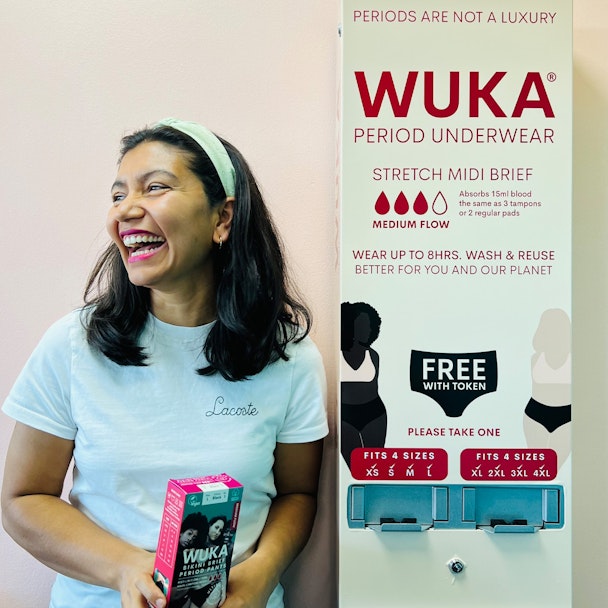Wuka founder wants south Asian women to open up about menstruation
The sustainable period brand’s ‘Desi Period Stories’ uses levity to celebrate south Asian culture while busting taboos.

Wuka's chief executive officer Ruby Raut founded the brand in 2017 / Wuka
When Wuka’s founder and chief executive officer, Ruby Raut, was growing up in Nepal, reusable menstrual products were the norm. “My mum gave me one of her old saris to use as my first period product and that is what I did for nearly 20 years,” she tells The Drum.
Raut explains that, like many teens experiencing their first periods, she was drawn to disposable products for ease and hygiene, but that “waste disposal was a huge problem in Nepal” and the items would impractically need to be burned or buried after use.
Despite the obvious sustainable nature of the reusable scraps of fabric, Raut says the lack of functionality presented a serious issue. “I used to try and pin the rags to my underwear because we had quite a few incidents in school where they would fall out and on to the ground, causing huge embarrassment. Many of my friends stopped coming to school.”
Advertisement
Her teenage resourcefulness would come in handy years later when, after moving to the UK and pursuing a degree in environmental science, Raut noticed a gap in the market for sustainable and hygienic reusable period underwear. She went on to found Wuka in 2017.
While reusable period products might be mainstream these days, Raut says this wasn’t the case back then. “At the time, disposable products were always marketed as clean and hygienic, so in order to replace traditional pads and tampons, we had to ensure Wuka’s period pants were machine washable.” She also replaced the plastic wicking used in some other absorbent underwear with more biodegradable materials.
Raut says her mission remains to normalize conversations about periods and bring them into the mainstream for the benefit of the women at the heart of Wuka’s consumer base. “One of the things we’ve been adamant about since day one is that we are size inclusive and ethnically inclusive.”
Advertisement
Priya Chande, Wuka’s global brand director, adds that due to the brand being female and immigrant-founded, it has “always had a more diverse audience.”
“Over the years, the brand has continued to try to amplify the voices of people who would otherwise not be seen in the mainstream. I guess because, inherently, Ruby herself has felt not represented in the mainstream.”
Chande goes on to explain that, due to Raut’s own south Asian heritage, the brand has ”attracted that audience pretty organically.” However, its latest campaign ‘Desi Period Stories’ is the first to speak to the community specifically.
After winning the JCDecaux’s Reach competition to bring diversity to UK outdoor advertising, ‘Desi Period Stories’ will appear on strategically placed billboards in hotspots like London’s Westfield shopping centers in east and west London where there are huge south-east Asian communities, as well as on social media and the platforms of featured influencers and activists Shani Dhanda, Seema Anand, Manisha Morgan and Lavina Mehta, who have a combined reach of 2 million.
Suggested newsletters for you
Set against the backdrop of a vibrant Indian wedding in Summer, these women are portrayed in different phases of their menstrual cycle – from first periods to menopause, with a “nervous dulhan (bride),” the “wise dadimas (grannies),” “hot and bothered aunties” and the “innocent betis (daughters).
“We hope people are going to look up and think, ’hey, I was at a wedding just the other day and I was on my period and it was totally chill!’ and hopefully draw those connections for an audience that haven’t been spoken to in this way before.
“It’s peak wedding season so it couldn’t have come at a better time!”
Chande says she also hopes the campaign will encourage some intergenerational conversations “because it’s not just about the first period, it’s about the bride who’s maybe having period sex on her wedding night, through to the perimenopausal aunties and the incontinent granny!”
Representation was also crucial during the development of the campaign, says Chande: “From beginning to end, every single person who worked on this campaign is from the south Asian diaspora, from the photographers through to the make-up artists, editors and graphic designers.”
She says everyone was delighted to be working on a campaign that celebrates the culture: “It’s not down and depressing, which campaigns about immigration and racism and those heavy topics often can be. It’s about time that we, as a community, got to come together and celebrate and have some fun.”

